 A Culture of Joy is the biggest determinant of safe and high quality healthcare! That is such a phenomenal statement that it is worth reading over and over again, making it into a poster, sticking it on your wall and meditating on it morning and night. It feels to be simultaneously absolutely true and somehow beyond belief. I’ve previously blogged here about the need for a culture of kindness in the NHS, and I hold to that – kindness certainly doesn’t exclude joy (!), but a Culture of Joy….. I don’t know, in a day in which 50% of our staff admit to feeling burnt out, can we honestly say we have developed this throughout our health system in the UK? So, what does it take to build this? How do we have a joyful workplace? If it is really the single largest factor affecting patient safety, which research from The Mayo Clinic, The IHI and The Quality Forum tell us it is, then we better sit up, pay attention and do something about it!
A Culture of Joy is the biggest determinant of safe and high quality healthcare! That is such a phenomenal statement that it is worth reading over and over again, making it into a poster, sticking it on your wall and meditating on it morning and night. It feels to be simultaneously absolutely true and somehow beyond belief. I’ve previously blogged here about the need for a culture of kindness in the NHS, and I hold to that – kindness certainly doesn’t exclude joy (!), but a Culture of Joy….. I don’t know, in a day in which 50% of our staff admit to feeling burnt out, can we honestly say we have developed this throughout our health system in the UK? So, what does it take to build this? How do we have a joyful workplace? If it is really the single largest factor affecting patient safety, which research from The Mayo Clinic, The IHI and The Quality Forum tell us it is, then we better sit up, pay attention and do something about it!
There are 3 key ingredients to creating a culture of Joy. The first (and this is in no sense a hierarchical order!) is leadership, the second is how 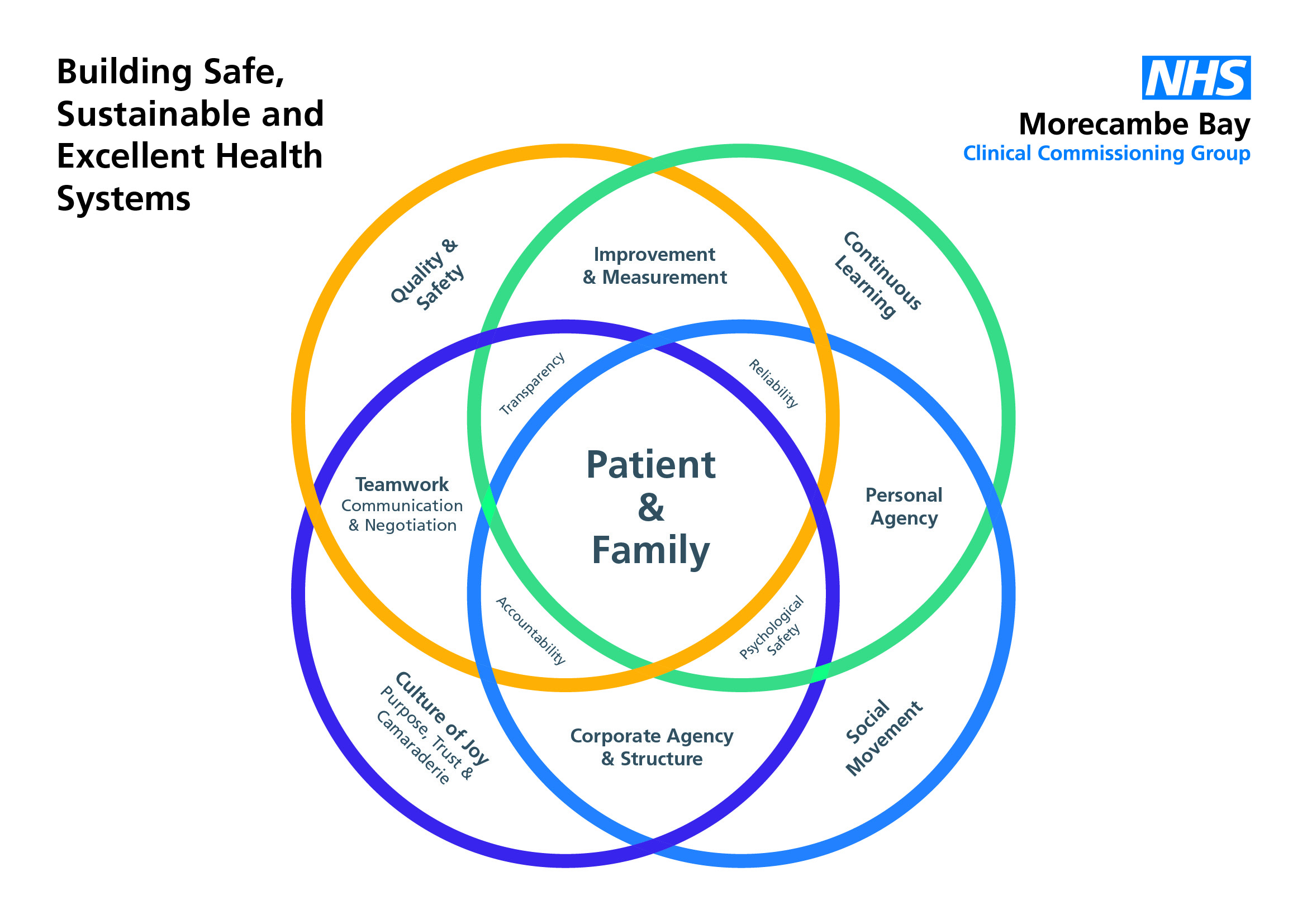
teams actually function together and the third is personal responsibility. You will see the words incorporated from the ‘culture circle’ in bold!
Good Leadership: Here’s a fascinating fact, I learnt from Stephen Swensen, of The Mayo Clinic – The bigger the signature of a CEO, the worse the outcomes for patients, staff and the finances of the organisation!! CEOs are responsible for setting the structures in place that allow healthy cultures to develop. Leaders create a culture of joy by having humility and developing 5 key behaviours:
- Appreciation – good leaders build joy in their teams by saying ‘Thank You’ – it is one of the things the team at my surgery consistently tells us, as partners. Of course we are grateful, but we don’t say it enough. Every member of a team knowing that they have value is so vital. I remember, as a house officer on a medical ward watching a lady called Jean, cleaning the ward and saying hello to all the patients. I went up to her and said, “Jean, I just want to thank you for everything you do on this ward, every day. The way you keep this place clean helps fight off infections and keeps people well; and the smile and kindness you bring is really comforting to people who are scared or hurting.” To my great surprise, she burst out crying. I asked her what was wrong and she told me that she had worked on this ward for 25 years and no-one had ever said ‘Thank You’ to her. My favourite hashtag on twitter is trybeinggrateful – it costs so little.
- Transparency – good leaders communicate openly with their teams. They don’t do ‘special huddles’ in which they invite a few ‘high level’ people to know their secrets. No. They communicate with honesty and openness and this builds trust. And with trust they are able to negotiate difficult situations and requests of their teams, because there is a belief that everyone is in it together.
- Ideas – They look to their teams for ideas. One of the things I loved learning about recently is that the CEO of Toyota in Derby, deliberately does not park his car in the special ‘CEO parking space’ right next to the building. Instead, he parks it at the far end of the factory, so that the walk to his office takes him through every department, (a good 30 minutes of his time), so he he can say “hi” to his staff, connect with them and ensure that he is hearing about their ideas for innovation and improvement. Toyota takes 2.5 million suggestions from its staff every year. This simply doesn’t happen enough in the NHS, and I wonder how many CEOs take time at the start of the day, to walk the corridors, listen to patient stories, understand the pressures in the ED, hear the heartbeat of the wards and get a sense of the ideas brewing in some of the most compassionate, caring and intelligent staff of any organisation in the UK. If we are to transform the NHS into a system that is truly safe, sustainable and excellent, we must listen more to the ideas of our teams and in doing so, we will cut waste, undo the reems of red tape and instead find we are working far more effectively and efficiently. To embed this into the culture, there must be psychological safety – that means that no question is too stupid, no idea is too dumb and it is safe to bring to attention concerns a person may have, without a fear of retribution. One great question for leaders to ask is, “what are the pebbles in your shoes?’ – in other words, what matters to you? Or what are the barriers for you here? What’s getting in the way? Great CEOs do not have great answers, they are willing to work with complexity and have great questions!
- Career Mentorship – every person needs to be able to keep learning and develop in their role. We all need mentors or coaches at different stages in our careers, and ensuring these structures are in place to support staff as the complexity and pressure we deal with increase, is vital in building joy. People who are developing in their role are naturally safer in their role.
- Inclusiveness – To a good leader, it doesn’t matter who you are, what you look like, what you believe, what your sexual orientation or
 status might be. You need to know that you are welcome and you are loved just as you are. Inclusive teams that do not scapegoat, do not sideline and do not bully are joyful teams. Joyful teams celebrate difference and thrive off it.
status might be. You need to know that you are welcome and you are loved just as you are. Inclusive teams that do not scapegoat, do not sideline and do not bully are joyful teams. Joyful teams celebrate difference and thrive off it.
Joyful Teams: It’s really important to understand that joy does not mean false happiness. It does not mean that we walk around with fake smiles on our faces all the time and pretend that everything is ok. Joy is much deeper than that. We deal with very sad and difficult things in our workplaces every single day. We break bad news, we hold people as they take their final breaths, we watch people make terrible life choices, we see and carry the hurt of those who suffer loss and each of us has our own burdens we carry from the lives we live outside of work. Joyful teams do not pretend like that stuff isn’t happening every day – quite the opposite. Joyful teams develop three key qualities:
- Camaraderie. The high school musical song – ‘We’re all in this together’ is a great theme tune for NHS teams. People need to know that they belong, that they are loved and that people care about them. On good days, we celebrate together, on bad days, we pull together. Joyful teams develop encouragement, support and kindness in how they treat each other.
- Purpose. Joyful teams have a real sense of shared vision and purpose. They know what they are there to do and each person knows that they are valued in that team. The posh term for this is a sense of corporate agency. This is our job to do, we are responsible for what happens here and we want to do our work with excellence.
- Trust. It is really important that individuals feel trusted to do their job without feeling like they are always being watched or criticised or that they have to give an account for every action. When people feel trusted, they actually work more effectively and produce better outcomes.
 Personal Responsibility: in order to create a culture of joy, it is not just the responsibility of the CEO or team leader, nor the atmosphere created by the team as a whole – we each have a responsibility to steward and hold to this culture. And that means taking care of our own needs. We need to be active, eat well, take notice, be mindful, sleep well, forgive those who hurt us and have good friendships. Making sure that we ‘host ourselves’ well, ensures that we play our part in building the culture of joy that is so vital to the providing care that is of the highest quality and safety. There is a personal accountability to ourselves and to those we work with to ensure this is so. There is also personal agency that rises to the challenge that each one of us can set a new trend and make a significant difference to the culture in which we work.
Personal Responsibility: in order to create a culture of joy, it is not just the responsibility of the CEO or team leader, nor the atmosphere created by the team as a whole – we each have a responsibility to steward and hold to this culture. And that means taking care of our own needs. We need to be active, eat well, take notice, be mindful, sleep well, forgive those who hurt us and have good friendships. Making sure that we ‘host ourselves’ well, ensures that we play our part in building the culture of joy that is so vital to the providing care that is of the highest quality and safety. There is a personal accountability to ourselves and to those we work with to ensure this is so. There is also personal agency that rises to the challenge that each one of us can set a new trend and make a significant difference to the culture in which we work.
In the midst of all we are currently facing in the NHS, for the sake of our patients and their families, it is vital that we build cultures of joy now and cultivate them for the future.

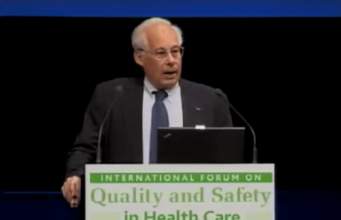
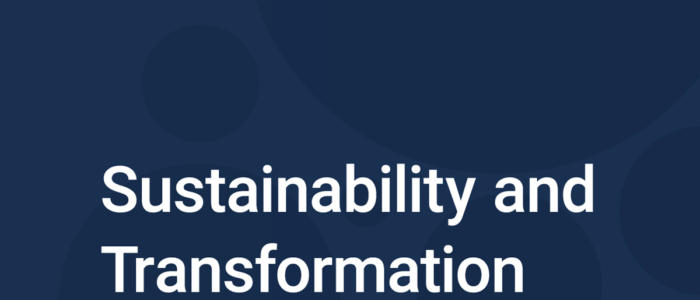
 All this week on the BBC, there has been a focus on the NHS and the crisis we are in – don’t panic Mr Mainwaring…..There is a heady mix of opinions being thrown around – Question Time became quite a furore of ideas and thoughts last night – not enough beds, not enough staff, not enough money, too much money, too many patients, too many wasted appointments, too many malingerers, too many ill people, too many old people, too many managers, too many drugs, too many drunkards, disappointed clinicians, disappointed patients, disappointed MPs, a disappointed health secretary – what are we to think and what are we to do?
All this week on the BBC, there has been a focus on the NHS and the crisis we are in – don’t panic Mr Mainwaring…..There is a heady mix of opinions being thrown around – Question Time became quite a furore of ideas and thoughts last night – not enough beds, not enough staff, not enough money, too much money, too many patients, too many wasted appointments, too many malingerers, too many ill people, too many old people, too many managers, too many drugs, too many drunkards, disappointed clinicians, disappointed patients, disappointed MPs, a disappointed health secretary – what are we to think and what are we to do? We love the NHS because it speaks something to us about our togetherness and our commitment to health justice for all. This circular argument about money is the wrong conversation and it is beginning to have a very nasty undertone about who we might be able to blame and scapegoat in order to solve the mess we are in. Let’s be very clear. The NHS is NOT in crisis because of refugees, asylum seekers, immigrants or health tourists. I’m going to stick my neck out here – it isn’t even the fault of the current and previous health secretaries, though it would be easy to play the blame game that way too. The NHS is in crisis, because the entire Western World is in crisis! Our economic systems are broken and our political systems are pretty defunct. We have built our nation state on the foundations of empire. We have built our economy on conquest and slavery and have used debt, violence and law to keep control….but everything is shaking.
We love the NHS because it speaks something to us about our togetherness and our commitment to health justice for all. This circular argument about money is the wrong conversation and it is beginning to have a very nasty undertone about who we might be able to blame and scapegoat in order to solve the mess we are in. Let’s be very clear. The NHS is NOT in crisis because of refugees, asylum seekers, immigrants or health tourists. I’m going to stick my neck out here – it isn’t even the fault of the current and previous health secretaries, though it would be easy to play the blame game that way too. The NHS is in crisis, because the entire Western World is in crisis! Our economic systems are broken and our political systems are pretty defunct. We have built our nation state on the foundations of empire. We have built our economy on conquest and slavery and have used debt, violence and law to keep control….but everything is shaking. brave enough to rewire our brains, realign our values and reimagine a different way of being together? If we accept that things simply cannot remain as they are, might we instead find one another in fresh ways and discover new ways of being in which we’re not always chasing the money, with all its strings attached, but choosing something altogether more life giving?
brave enough to rewire our brains, realign our values and reimagine a different way of being together? If we accept that things simply cannot remain as they are, might we instead find one another in fresh ways and discover new ways of being in which we’re not always chasing the money, with all its strings attached, but choosing something altogether more life giving? I would suggest we need two things (an ambidextrous approach) – both of which are already happening, we just need to recognise them, fan the flames and watch the new emerge, whilst Rome burns around us.
I would suggest we need two things (an ambidextrous approach) – both of which are already happening, we just need to recognise them, fan the flames and watch the new emerge, whilst Rome burns around us.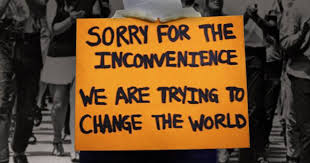 are beginning to think about how we are living and making a change. It’s a tough reality, but there is personal and corporate responsibility that we need to take. We cannot keep shoving poison into our bodies or treating them badly and expect that we will be well, or that we will be able to afford the drugs to fix us. Social movements are beginning to emerge and we need to be a part of them. Together, we can! Together we can cause corporations to change their behaviour and act in accordance with what is right, true, just, kind and loving. We can also choose to take responsibility for what we buy and how much exercise we do. Here in Morecambe Bay we are launching the Morecambe Bay Mile, encouraging everyone to move a mile a day without transport! We’re also working with our communities around diet. We’re also connecting with amazing people doing amazing things and seeing just how much kindness and goodness there is in the communities around us. Our happiness is directly linked to the quality and depth of our friendships. People being together and facing up to the issues together is absolutely key to our long term health.
are beginning to think about how we are living and making a change. It’s a tough reality, but there is personal and corporate responsibility that we need to take. We cannot keep shoving poison into our bodies or treating them badly and expect that we will be well, or that we will be able to afford the drugs to fix us. Social movements are beginning to emerge and we need to be a part of them. Together, we can! Together we can cause corporations to change their behaviour and act in accordance with what is right, true, just, kind and loving. We can also choose to take responsibility for what we buy and how much exercise we do. Here in Morecambe Bay we are launching the Morecambe Bay Mile, encouraging everyone to move a mile a day without transport! We’re also working with our communities around diet. We’re also connecting with amazing people doing amazing things and seeing just how much kindness and goodness there is in the communities around us. Our happiness is directly linked to the quality and depth of our friendships. People being together and facing up to the issues together is absolutely key to our long term health.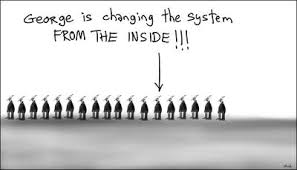 Secondly, we must stop serving the system, re-humanise it, call it in line and cause it to serve the needs of the people and the planet (the right handed approach). Those in the health and social care system must refuse to be bullied by the powers into ways of behaving, stop thinking they have the answers and therefore coming up with another new scheme to do to people and be willing to listen to and work with the emerging social movements. This will allow us to see a society that is much more well and therefore in need of less care. But where care is needed, we have to accept that we have allowed ourselves to be competitive rather than collaborative, hierarchical instead of co-operative and our own attitudes and behaviours are stopping us from giving the compassionate care we long to deliver. We cannot make excuses. We must let go of self-protectionism. We must be willing to change the way we think and behave, breaking down walls, letting go of suspicion and cutting through red tape so that we provide the care which we can. This is happening, here in Morecambe Bay – but it’s not a quick thing. We are rediscovering the power of relationship and daring to make some bold steps into delivering care very differently – but for those of you outside the system, please understand, it takes time and feels pretty scary!
Secondly, we must stop serving the system, re-humanise it, call it in line and cause it to serve the needs of the people and the planet (the right handed approach). Those in the health and social care system must refuse to be bullied by the powers into ways of behaving, stop thinking they have the answers and therefore coming up with another new scheme to do to people and be willing to listen to and work with the emerging social movements. This will allow us to see a society that is much more well and therefore in need of less care. But where care is needed, we have to accept that we have allowed ourselves to be competitive rather than collaborative, hierarchical instead of co-operative and our own attitudes and behaviours are stopping us from giving the compassionate care we long to deliver. We cannot make excuses. We must let go of self-protectionism. We must be willing to change the way we think and behave, breaking down walls, letting go of suspicion and cutting through red tape so that we provide the care which we can. This is happening, here in Morecambe Bay – but it’s not a quick thing. We are rediscovering the power of relationship and daring to make some bold steps into delivering care very differently – but for those of you outside the system, please understand, it takes time and feels pretty scary! more healthy and well and we changed our ways of working to be more collaborative and kind. It is this ambidextrous approach to health and wellbeing, in which a heady mix of an invigorated people movement and a reorientated system working together for the good of everyone everywhere, might breathe hope into other parts of the world that out of the old can come something new. Maybe it is just possible that healthcare can be provided for everyone everywhere when people are brave enough to let go of old ways, embrace the brokenness of our reality and find a new way through together.
more healthy and well and we changed our ways of working to be more collaborative and kind. It is this ambidextrous approach to health and wellbeing, in which a heady mix of an invigorated people movement and a reorientated system working together for the good of everyone everywhere, might breathe hope into other parts of the world that out of the old can come something new. Maybe it is just possible that healthcare can be provided for everyone everywhere when people are brave enough to let go of old ways, embrace the brokenness of our reality and find a new way through together. I’m telling you – it is nearly Spring time and the bulbs are beginning to break through. Can you smell the scent of something new emerging? Those rhizomal roots of the snowdrops – that interconnected underground network that shoots up its flowers, is telling us the winter of discontent is over. It’s time to turn off the radio, dial down the meta narrative of fear and instead, put on love, hope and faith, find each other, change our ways of working and step into the future we know our hearts yearn for.
I’m telling you – it is nearly Spring time and the bulbs are beginning to break through. Can you smell the scent of something new emerging? Those rhizomal roots of the snowdrops – that interconnected underground network that shoots up its flowers, is telling us the winter of discontent is over. It’s time to turn off the radio, dial down the meta narrative of fear and instead, put on love, hope and faith, find each other, change our ways of working and step into the future we know our hearts yearn for.
 In my last blog, I talked about the exponential potential of what could be possible if clinicians worked together in a more collaborative way. However, far more can be achieved if we work together in and with our communities to create a social movement together around being more healthy and well. I’ve talked previously about the “battle royale” that occurred between Béchamp and Pasteur over whether we should promote health or fight disease. The answer is, of course, that we need to do both, but the clinical community is not equipped with the resource or power to do it alone.
In my last blog, I talked about the exponential potential of what could be possible if clinicians worked together in a more collaborative way. However, far more can be achieved if we work together in and with our communities to create a social movement together around being more healthy and well. I’ve talked previously about the “battle royale” that occurred between Béchamp and Pasteur over whether we should promote health or fight disease. The answer is, of course, that we need to do both, but the clinical community is not equipped with the resource or power to do it alone. crises we now face are too much for us to do anything about. We are in the midst of a battle, which we are currently losing and it is time to gird our loins for a turning of the tide. Here in Morecambe Bay, we have started a conversation, not just among the Clinical Community but with the wider population about how we might become the healthiest place in the UK. Yes, we mean this in a very holistic way, but there are also some specific foci we have so we can together reverse some of the appalling health statistics we are facing.
crises we now face are too much for us to do anything about. We are in the midst of a battle, which we are currently losing and it is time to gird our loins for a turning of the tide. Here in Morecambe Bay, we have started a conversation, not just among the Clinical Community but with the wider population about how we might become the healthiest place in the UK. Yes, we mean this in a very holistic way, but there are also some specific foci we have so we can together reverse some of the appalling health statistics we are facing. I suggest that within a generation, if we wanted to, we could render Type 2 Diabetes a rare diagnosis. We can do this through encouraging far more healthy lifestyles in our children and young people now, like running a mile a day and learning to eat food that doesn’t actually harm them! I believe we could significantly reduce the need for so many people to be taking medication for hypertension and diabetes now, prevent many strokes and heart attacks, by being violent towards these conditions with major changes in lifestyle, though diet and exercise, rather than the prescription of drugs, using coaching, peer support and local champions to give psychological motivation and encouragement. We are beginning to have some excellent discussions and develop some exciting plans around this.
I suggest that within a generation, if we wanted to, we could render Type 2 Diabetes a rare diagnosis. We can do this through encouraging far more healthy lifestyles in our children and young people now, like running a mile a day and learning to eat food that doesn’t actually harm them! I believe we could significantly reduce the need for so many people to be taking medication for hypertension and diabetes now, prevent many strokes and heart attacks, by being violent towards these conditions with major changes in lifestyle, though diet and exercise, rather than the prescription of drugs, using coaching, peer support and local champions to give psychological motivation and encouragement. We are beginning to have some excellent discussions and develop some exciting plans around this. pull themselves back from the brink of a lifetime of medication and we should use all medication reviews as a chance to help people adopt lifestyles that might reverse the need for such drugs. In the process, we would also significantly reverse our number of cancer diagnoses – many of which are linked to our lifestyle choices. We simply can’t afford for our current and failing approach to continue. We need to be braver together! And this means the NHS must be willing to partner in new ways, not only with local people, but also with businesses like the major supermarkets to help reverse our current direction towards the abyss, in which there is no longer a healthcare system that serves the needs of everyone, no matter where they come from or how much they do or don’t earn.
pull themselves back from the brink of a lifetime of medication and we should use all medication reviews as a chance to help people adopt lifestyles that might reverse the need for such drugs. In the process, we would also significantly reverse our number of cancer diagnoses – many of which are linked to our lifestyle choices. We simply can’t afford for our current and failing approach to continue. We need to be braver together! And this means the NHS must be willing to partner in new ways, not only with local people, but also with businesses like the major supermarkets to help reverse our current direction towards the abyss, in which there is no longer a healthcare system that serves the needs of everyone, no matter where they come from or how much they do or don’t earn. We can absolutely do this!! It’s going to take some serious resolve and we’re going to have to withstand the fear and pressure of some pretty powerful lobbies, like the sugar, alcohol, tobacco and pharmaceutical giants, and perhaps even the government itself, but it is time for us to do the impossible. With love, hope and faith, we can do this! Yes we need to focus on schools and work places. Yes, we need to partner with organisations we’ve never worked with before. Yes, we need a far more effective media strategy and yes, we need to allow clinicians to work very differently. But we cannot do nothing. So let’s try something a whole lot more radical. That’s what we’re going for in Morecambe Bay – not just better care together, but better health together – you can watch and wait, and see if we sink or swim, or you can join us!
We can absolutely do this!! It’s going to take some serious resolve and we’re going to have to withstand the fear and pressure of some pretty powerful lobbies, like the sugar, alcohol, tobacco and pharmaceutical giants, and perhaps even the government itself, but it is time for us to do the impossible. With love, hope and faith, we can do this! Yes we need to focus on schools and work places. Yes, we need to partner with organisations we’ve never worked with before. Yes, we need a far more effective media strategy and yes, we need to allow clinicians to work very differently. But we cannot do nothing. So let’s try something a whole lot more radical. That’s what we’re going for in Morecambe Bay – not just better care together, but better health together – you can watch and wait, and see if we sink or swim, or you can join us! We need to reimagine ourselves as all being part of a team who are together tackling the health crises we are facing. We know only too well that, as just one example among many, we are failing kids with asthma because we have not joined up our resources or thinking adequately enough. Yes there are major issues with housing, smoking and pollution, but let’s not point the finger or push the problem somewhere else. Let’s use the phenomenal brains God has given us to pull the right people round the table and work out what we’re going to do about it. Let’s change the way we spend our time so that we’re in schools, we’re listening to our communities and we’re partnering together outside of our normal comfort zones to change the health of the generations to come. We know only too well, that if we don’t shift our focus towards population health and work more intentionally with our communities, doing things with them rather than too them, we will never win this battle. We’re not about playing political games. We are about working with our communities to create optimal health for every person no matter who they are or where they are from. We need to be braver, push the boat away from the shore we know and face the uncertain waters of working altogether differently. In my next blog I will explore some of the possible ways we could work differently.
We need to reimagine ourselves as all being part of a team who are together tackling the health crises we are facing. We know only too well that, as just one example among many, we are failing kids with asthma because we have not joined up our resources or thinking adequately enough. Yes there are major issues with housing, smoking and pollution, but let’s not point the finger or push the problem somewhere else. Let’s use the phenomenal brains God has given us to pull the right people round the table and work out what we’re going to do about it. Let’s change the way we spend our time so that we’re in schools, we’re listening to our communities and we’re partnering together outside of our normal comfort zones to change the health of the generations to come. We know only too well, that if we don’t shift our focus towards population health and work more intentionally with our communities, doing things with them rather than too them, we will never win this battle. We’re not about playing political games. We are about working with our communities to create optimal health for every person no matter who they are or where they are from. We need to be braver, push the boat away from the shore we know and face the uncertain waters of working altogether differently. In my next blog I will explore some of the possible ways we could work differently. As clinicians we must, as many have stated this week, build bridges not walls. There is far too much division, suspicion and competition amongst us. (Here comes the swearing)…..I was in a conversation with a consultant colleague recently and he was relaying to me that another consultant referred to GPs as a “bunch of Fuck Wits”. In a separate conversation, one of my GP colleagues referred to consultants as a “bunch of arrogant Shits”. These kind of attitudes pervade the NHS and have created a culture of dishonour, distrust and division. Honestly! We’re better than this. How are we going to create the new workforce of the future that works across our currently artificial boundaries if we don’t teach them basic respect? This week a patient came to see me because he was dismayed at having to have seen a nurse at the hospital after suffering a significant condition and wanted to check that I, as a doctor, was happy with what he had been told. I could have laughed it off, but I wanted to stand up for my nursing colleague, who actually has far more expertise in this area of medicine than I do. The advice he had been given was perfect and completely in line with the best guidance available. We must not be afraid to challenge attitudes that are antiquated and out of place. More than ever, we need a culture of honour. A culture of honour is one in which we believe the best of each other, speak well of each other and appreciate our brilliantly necessary but differing gifts and expertise. We need to work out how we work effectively together for the best of the people we serve. We need to connect with each other and rehumanise the system in which we work. When was the last time you met as a cross cultural or multidisciplinary team and simply told each other what you love and appreciate about each other and the work you do? If we can’t learn to be more relationally whole, we will continue to work in the midst of serious dysfunction and strife. Come on – amongst us we have some remarkable gifts of wisdom, healing and hope. Let’s build the kind of culture and community amongst us that stands shoulder to shoulder, changes the story in the media and speaks with one voice to the powers that we are about the a new way of working together through relationship not hierarchy and fear. What might we really achieve together? It is this kind of collaborative clinical community that can change the future of healthcare, not just in the UK, but right across the globe.
As clinicians we must, as many have stated this week, build bridges not walls. There is far too much division, suspicion and competition amongst us. (Here comes the swearing)…..I was in a conversation with a consultant colleague recently and he was relaying to me that another consultant referred to GPs as a “bunch of Fuck Wits”. In a separate conversation, one of my GP colleagues referred to consultants as a “bunch of arrogant Shits”. These kind of attitudes pervade the NHS and have created a culture of dishonour, distrust and division. Honestly! We’re better than this. How are we going to create the new workforce of the future that works across our currently artificial boundaries if we don’t teach them basic respect? This week a patient came to see me because he was dismayed at having to have seen a nurse at the hospital after suffering a significant condition and wanted to check that I, as a doctor, was happy with what he had been told. I could have laughed it off, but I wanted to stand up for my nursing colleague, who actually has far more expertise in this area of medicine than I do. The advice he had been given was perfect and completely in line with the best guidance available. We must not be afraid to challenge attitudes that are antiquated and out of place. More than ever, we need a culture of honour. A culture of honour is one in which we believe the best of each other, speak well of each other and appreciate our brilliantly necessary but differing gifts and expertise. We need to work out how we work effectively together for the best of the people we serve. We need to connect with each other and rehumanise the system in which we work. When was the last time you met as a cross cultural or multidisciplinary team and simply told each other what you love and appreciate about each other and the work you do? If we can’t learn to be more relationally whole, we will continue to work in the midst of serious dysfunction and strife. Come on – amongst us we have some remarkable gifts of wisdom, healing and hope. Let’s build the kind of culture and community amongst us that stands shoulder to shoulder, changes the story in the media and speaks with one voice to the powers that we are about the a new way of working together through relationship not hierarchy and fear. What might we really achieve together? It is this kind of collaborative clinical community that can change the future of healthcare, not just in the UK, but right across the globe.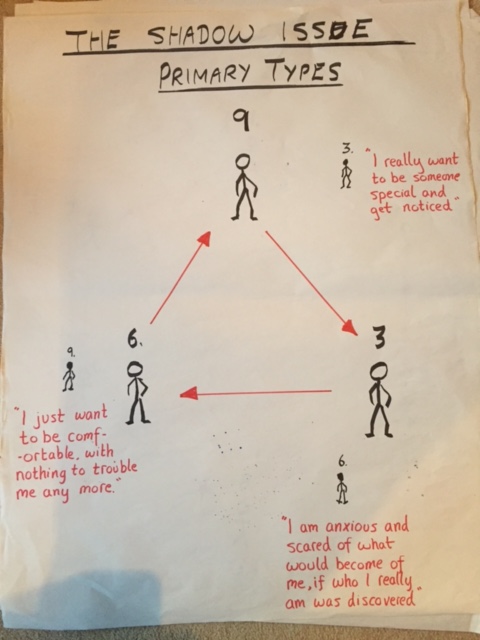 So, focusing in on the UK (maybe some thoughts on the lovely USA another time), if we are to shift the political discourse towards something more healthy for the future, we need to learn to listen to the part of us that feels the need to be safe. We need to understand the ‘shadow’ part of our corporate personality that is anxious and fearful, admitting to ourselves what drives our thoughts and actions. When a Type 6 personality is not in a healthy place, they will begin to regress into a Type 3 pattern of thinking. So, the underlying drive to be safe becomes the need to get noticed and be special. So, post-brexit, some of which was about the need to be safe, we find our politicans trying to re-assert our Soverignty and our ‘Greatness’. Only a couple of weeks ago, Boris Johnson, the Foreign Secretary, was declaring on the radio that we don’t realise quite how the rest of the world sees us. Apparently, they admire us and think we need to continue showing great leadership in the world. We continue to believe this about ourselves, that we are very special and have a vital role which the rest of the world needs us to play. I wonder if we actually asked the rest of the world whether or not this is true, they might laugh in our face, pat us on the head and gently remind us that the world has moved on, but maybe we have not.
So, focusing in on the UK (maybe some thoughts on the lovely USA another time), if we are to shift the political discourse towards something more healthy for the future, we need to learn to listen to the part of us that feels the need to be safe. We need to understand the ‘shadow’ part of our corporate personality that is anxious and fearful, admitting to ourselves what drives our thoughts and actions. When a Type 6 personality is not in a healthy place, they will begin to regress into a Type 3 pattern of thinking. So, the underlying drive to be safe becomes the need to get noticed and be special. So, post-brexit, some of which was about the need to be safe, we find our politicans trying to re-assert our Soverignty and our ‘Greatness’. Only a couple of weeks ago, Boris Johnson, the Foreign Secretary, was declaring on the radio that we don’t realise quite how the rest of the world sees us. Apparently, they admire us and think we need to continue showing great leadership in the world. We continue to believe this about ourselves, that we are very special and have a vital role which the rest of the world needs us to play. I wonder if we actually asked the rest of the world whether or not this is true, they might laugh in our face, pat us on the head and gently remind us that the world has moved on, but maybe we have not.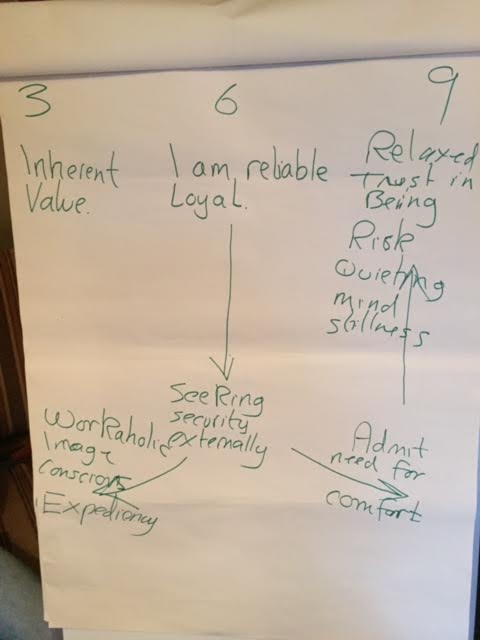
 We often talk about physical, mental, social and even systemic health, but we don’t often think or talk about the health of our personalities. Our personalities are shaped by our self-esteem, our values, our truths, our needs, our struggles, our instincts and our gifts. They impact every part of our lives, relationships and interactions with the world at large and although we give some focus to understanding them through tools like Myers-Briggs, the Enneagram and Strengths-Finder, (perhaps to make us more successful), we give little thought to how healthy we are when it comes to this subject.
We often talk about physical, mental, social and even systemic health, but we don’t often think or talk about the health of our personalities. Our personalities are shaped by our self-esteem, our values, our truths, our needs, our struggles, our instincts and our gifts. They impact every part of our lives, relationships and interactions with the world at large and although we give some focus to understanding them through tools like Myers-Briggs, the Enneagram and Strengths-Finder, (perhaps to make us more successful), we give little thought to how healthy we are when it comes to this subject.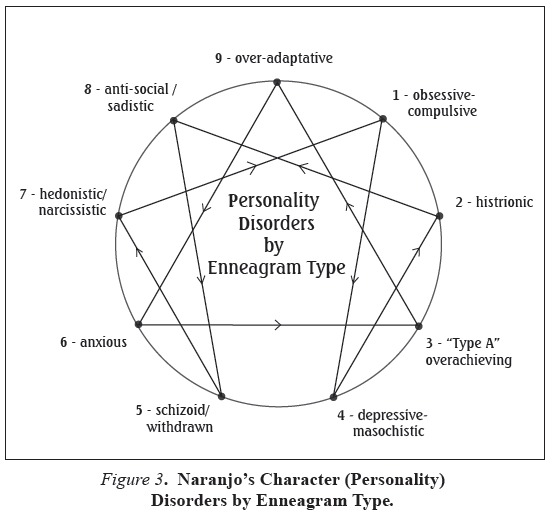 Now, what is particularly interesting to me as a doctor are 2 things related to this. Firstly, our personality type is hugely linked to the kind of mental health problems we might be more likely to develop. I wonder how often clinicians see the presentation of a mental illness and are able to talk with the person in front of them about which aspects of their personality might need therapy in order to help their mental health improve? As the whole area of positive psychology develops, it is vital that there are learning environments in which clinical teams can learn about innovative approaches in psychology that avoid the over prescribing of medication, especially in our younger population.
Now, what is particularly interesting to me as a doctor are 2 things related to this. Firstly, our personality type is hugely linked to the kind of mental health problems we might be more likely to develop. I wonder how often clinicians see the presentation of a mental illness and are able to talk with the person in front of them about which aspects of their personality might need therapy in order to help their mental health improve? As the whole area of positive psychology develops, it is vital that there are learning environments in which clinical teams can learn about innovative approaches in psychology that avoid the over prescribing of medication, especially in our younger population. The second area of interest is to do with how we can be more self-aware of how healthy we are or when we have reached a point at which we can no longer really help ourselves but need others who love us or care about to to intervene. Below is a chart (of sorts) which I learned about during a weekend on the Enneagram. It helps to explain aspects of personality health. I recognise that at times I am functioning more healthily than at other times, due to a combination of internal and external factors. I think there are behaviours we can be aware of, or ways in which we are operating in relationships and situations which should serve as a WAKE UP CALL to us. When we notice more negative patterns, we need to take stock of where we are and work out our lines of responsibility to help us back into a more healthy state. However, if we don’t, things can continue to worsen until we reach a point at which we need others to intervene on our behalf and rescue us from our self-destructive and damaging sickness.
The second area of interest is to do with how we can be more self-aware of how healthy we are or when we have reached a point at which we can no longer really help ourselves but need others who love us or care about to to intervene. Below is a chart (of sorts) which I learned about during a weekend on the Enneagram. It helps to explain aspects of personality health. I recognise that at times I am functioning more healthily than at other times, due to a combination of internal and external factors. I think there are behaviours we can be aware of, or ways in which we are operating in relationships and situations which should serve as a WAKE UP CALL to us. When we notice more negative patterns, we need to take stock of where we are and work out our lines of responsibility to help us back into a more healthy state. However, if we don’t, things can continue to worsen until we reach a point at which we need others to intervene on our behalf and rescue us from our self-destructive and damaging sickness. function healthily. However, through a mixture of internal and external factors, our hearts can become less healthy. When this occurs, our body will fire some warning shots to us, giving us a chance to change before something more serious occurs. This might be signs and symptoms do do with our weight, nutrition, fitness, level of breathlessness, vague chest pains, markers in our blood tests – like high cholesterol and high sugar, rising blood pressure etc. However, if we ignore the opportunities to change and continue with our unhealthy choices, eventually we will reach the point at which we have a significant event, e.g.the start of angina, a heart attack, a stroke, the development of diabetes. At that point we need the help of someone else – we can no longer do it on our own. Of course, we still have choices and can reject the help on offer, but if we do, we risk our own demise and ultimate death.
function healthily. However, through a mixture of internal and external factors, our hearts can become less healthy. When this occurs, our body will fire some warning shots to us, giving us a chance to change before something more serious occurs. This might be signs and symptoms do do with our weight, nutrition, fitness, level of breathlessness, vague chest pains, markers in our blood tests – like high cholesterol and high sugar, rising blood pressure etc. However, if we ignore the opportunities to change and continue with our unhealthy choices, eventually we will reach the point at which we have a significant event, e.g.the start of angina, a heart attack, a stroke, the development of diabetes. At that point we need the help of someone else – we can no longer do it on our own. Of course, we still have choices and can reject the help on offer, but if we do, we risk our own demise and ultimate death. My point is this. If we do not take the health of our own personalities seriously, there are serious and significant consequences, not only to ourselves but those around us and the world we live in. Many of us reach a point when we need help, but might not even face up to this, due to the poor health we are in. In those times, we need those who love and trust to be brave enough to reach in and offer us a life line. We may have even reached the place where we need resuscitation, when all our pride has gone. When we have ignored the red flag, we need those around us who will risk our total rejection of them to love us enough to offer us a way back to health. We need to take the health of our personalities seriously – it actually has a huge bearing on all the other aspects of our health. We also need
My point is this. If we do not take the health of our own personalities seriously, there are serious and significant consequences, not only to ourselves but those around us and the world we live in. Many of us reach a point when we need help, but might not even face up to this, due to the poor health we are in. In those times, we need those who love and trust to be brave enough to reach in and offer us a life line. We may have even reached the place where we need resuscitation, when all our pride has gone. When we have ignored the red flag, we need those around us who will risk our total rejection of them to love us enough to offer us a way back to health. We need to take the health of our personalities seriously – it actually has a huge bearing on all the other aspects of our health. We also need have huge health inequalities. There are major issues with housing, economic policies that are not working for huge swathes of our population, with more people having to use food banks, struggling with fuel poverty, living in damp houses and unable to make ends meet. Yes, our kids are spending more time on screens and less time in activity. Yes, the sugar lobby, alcohol lobby and advertising giants have far too much power. Supermarkets are designed deliberately so that we buy things that are bad for us. And sometimes, we just make poor choices (if you can call them choices, which for some people, they aren’t always) – we do not all live as healthily as we could – we eat the wrong stuff, work highly stressful jobs, and exercise less than we are recommended to. Mental health issues are on the rise, especially for teenagers, due to crazy targets and league tables, with all the pressures they face. We are less happy and more separated than we ever used to be, despite the rise in social media…..(or maybe because of it……)…..Man, I can paint a negative picture – it’s like storm clouds and darkness everywhere……..
have huge health inequalities. There are major issues with housing, economic policies that are not working for huge swathes of our population, with more people having to use food banks, struggling with fuel poverty, living in damp houses and unable to make ends meet. Yes, our kids are spending more time on screens and less time in activity. Yes, the sugar lobby, alcohol lobby and advertising giants have far too much power. Supermarkets are designed deliberately so that we buy things that are bad for us. And sometimes, we just make poor choices (if you can call them choices, which for some people, they aren’t always) – we do not all live as healthily as we could – we eat the wrong stuff, work highly stressful jobs, and exercise less than we are recommended to. Mental health issues are on the rise, especially for teenagers, due to crazy targets and league tables, with all the pressures they face. We are less happy and more separated than we ever used to be, despite the rise in social media…..(or maybe because of it……)…..Man, I can paint a negative picture – it’s like storm clouds and darkness everywhere…….. But what if it wasn’t that way? What if we got a bit angry about it, but instead of finding someone to blame and pointing the finger; instead of getting all tribal and throwing stones at others, we chose to use our energies creatively to find solutions, to work together and make positive changes?! Let’s put away our pointing fingers and our ranting tongues and let’s work together for a better future for everyone! Doesn’t that sound good?! It’s what we’re trying here in Morecambe Bay, and I’m hoping it spreads like wild fire so that we can become a place where health abounds and beauty surrounds (that’s the motto of this place!). That doesn’t mean we stop speaking truth to power, but we also let our actions (and maybe our votes) speak louder than ever before.
But what if it wasn’t that way? What if we got a bit angry about it, but instead of finding someone to blame and pointing the finger; instead of getting all tribal and throwing stones at others, we chose to use our energies creatively to find solutions, to work together and make positive changes?! Let’s put away our pointing fingers and our ranting tongues and let’s work together for a better future for everyone! Doesn’t that sound good?! It’s what we’re trying here in Morecambe Bay, and I’m hoping it spreads like wild fire so that we can become a place where health abounds and beauty surrounds (that’s the motto of this place!). That doesn’t mean we stop speaking truth to power, but we also let our actions (and maybe our votes) speak louder than ever before. We’re talking together, taking time to dream about what it would be like if we were the healthiest area in the UK. We’re training up many people to host conversations, so that we break down walls and learn to collaborate for the sake of everyone. We’re not just dreaming about physical health, but mental, social and systemic health as well. We’re encouraging those who want to rise up and take some leadership, to be pioneers in the stuff they are passionate about. Even in my little town, we now have a mental health cafe that is literally saving people’s lives, because a lady called Jane wanted to make a difference. We have a cafe for all the people who have circulation problems because one of our nurses wanted to break people’s isolation and improve their healing rates at the same time.
We’re talking together, taking time to dream about what it would be like if we were the healthiest area in the UK. We’re training up many people to host conversations, so that we break down walls and learn to collaborate for the sake of everyone. We’re not just dreaming about physical health, but mental, social and systemic health as well. We’re encouraging those who want to rise up and take some leadership, to be pioneers in the stuff they are passionate about. Even in my little town, we now have a mental health cafe that is literally saving people’s lives, because a lady called Jane wanted to make a difference. We have a cafe for all the people who have circulation problems because one of our nurses wanted to break people’s isolation and improve their healing rates at the same time.  We’ve got a carers cafe, a dementia cafe and will soon have a breathing cafe for those who have severe COPD, sharing ideas and diminishing anxiety. We’ve got exercise classes to help with pain, a community choir, dog poo wardens to help us take more pride when we walk down the street and food banks to help those who can no longer afford to eat.
We’ve got a carers cafe, a dementia cafe and will soon have a breathing cafe for those who have severe COPD, sharing ideas and diminishing anxiety. We’ve got exercise classes to help with pain, a community choir, dog poo wardens to help us take more pride when we walk down the street and food banks to help those who can no longer afford to eat.![image[1]](http://reimagininghealth.com/wp-content/uploads/2016/03/image1.jpg) We have 2000 kids aged 4-11 running a mile a day at school with staggering results for our children here in terms of physical, mental and educational health. We’re hoping over time, this becomes the Morecambe Bay Mile, part of a cultural shift towards being more active. We are working with local chefs and supermarkets to enable people with pre-diabetes or weight struggles to eat more healthily. We’re choosing to lead by example in the NHS to work well and flourish in our work places. We’ve made a commitment to see the 5 ways to wellbeing in every NHS organisation and we’re hoping many other systems and businesses will follow us in this. We’re finding radical ways to help people who are struggling with alcohol and drug addiction, get free and stay free with amazing results. We’re helping people live well with and beyond cancer.
We have 2000 kids aged 4-11 running a mile a day at school with staggering results for our children here in terms of physical, mental and educational health. We’re hoping over time, this becomes the Morecambe Bay Mile, part of a cultural shift towards being more active. We are working with local chefs and supermarkets to enable people with pre-diabetes or weight struggles to eat more healthily. We’re choosing to lead by example in the NHS to work well and flourish in our work places. We’ve made a commitment to see the 5 ways to wellbeing in every NHS organisation and we’re hoping many other systems and businesses will follow us in this. We’re finding radical ways to help people who are struggling with alcohol and drug addiction, get free and stay free with amazing results. We’re helping people live well with and beyond cancer. We’re changing the way consultations happen in the NHS to enable people to make more informed and better choices about their own health and conditions, so they feel empowered to make changes that work for them rather than beaten up when they go for an appointment! We’re launching the Morecambe Bay Poverty Truth challenge, learning from those who are lived
We’re changing the way consultations happen in the NHS to enable people to make more informed and better choices about their own health and conditions, so they feel empowered to make changes that work for them rather than beaten up when they go for an appointment! We’re launching the Morecambe Bay Poverty Truth challenge, learning from those who are lived 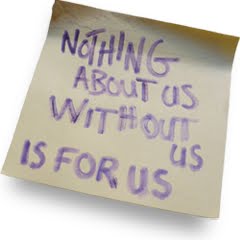 experts in poverty to help us work together and care better for those most struggling in our society. We’re having difficult conversations about death to help people be prepared for every eventuality.
experts in poverty to help us work together and care better for those most struggling in our society. We’re having difficult conversations about death to help people be prepared for every eventuality. will be awakened? What other partnerships, collaborations and relationships might be formed? Being all tribal and accusatory of others saps our energy and stops us being creative. Mud slinging and blame will achieve little. We have to work from where we are. We have to build bridges and work together. We have to build a future of positive peace and that means binary thinking is over! The future doesn’t have to be full of doom and gloom. It is alive with hope! What resources might we find? What talents might we discover? What might we see develop over the next 12 months/years/decades as we look for solutions together for a better future for everybody? Don’t you feel just a little bit excited?
will be awakened? What other partnerships, collaborations and relationships might be formed? Being all tribal and accusatory of others saps our energy and stops us being creative. Mud slinging and blame will achieve little. We have to work from where we are. We have to build bridges and work together. We have to build a future of positive peace and that means binary thinking is over! The future doesn’t have to be full of doom and gloom. It is alive with hope! What resources might we find? What talents might we discover? What might we see develop over the next 12 months/years/decades as we look for solutions together for a better future for everybody? Don’t you feel just a little bit excited?